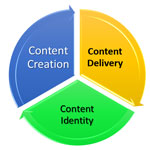Of all Rachel statements about the content, one has inspired me: We need to philosophize the content. If someone is going to be a real content strategist, there’s no way to bypass this stage.
Content Mission is one of the questions which should be answered before taking any step further. May the most popular definition of the content mission be Joe Pulizzi‘s in his article called why you need a content marketing mission statement.
Although Pulizzi tried to clarify his statement in his comment on the Nenad Senic‘s article mildly criticizing his approach, still I’m on Nenad side that the content mission as all the other mission statements must explicitly and clearly address the WHY behind. The HOWs will be much clear if we agree on a clear statement of WHYs.
Targeting the right audience, creating the right content and maintaining tangible outcome for the audience are surely the core of the content business. But the core purpose or raison d’etre for the content – as it is call by Collins and Porras in their classic book built to last – shall be something more fundamental.
As it is popular to limit the concept of content to digital content and mission of content to marketing, may it be tempting to define content mission as follows:
Mission of content is to inform or persuade potential consumers or customers to buy a product or service.
But considering the broader definition of content I stated before, would not be so easy to apply such a selling-oriented-mission to all the imaginable cases. How can I define the mission of a social network application if I consider it as a content generated for the web container?
Therefore, let me try to propose a more generic and applicable definition of content mission:
Any strategic activity of a person or an organizaition falls within two categories. Either making a better container competing against existing one or making a content for the existing container aimed to influence the whole system around and move it to a more favorable state. The latter can be considered as content mission.
Sure, a short-sighted view would evaluate the state based on its own interests and a far-sighted one, would consider interests of the system as a whole.
Considering above definition of content mission, would not be hard anymore to define the content mission in different contexts.
Facebook and other social networks can define their content strategy as moving the society toward a more connected state and shaping a global brain (although it will have characteristics more close to the limbic part of the human brain!). Content marketers also can define their mission as reshaping target market in a way that their product or brand gains more share of pocket or share of mind.
In the same way, news delivering agencies and public relations departments can think about content strategy just as political leaders can think about it to reshape connections and perceptions in the international community.
This is what I am going to discuss in details in further articles.





